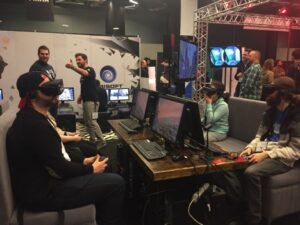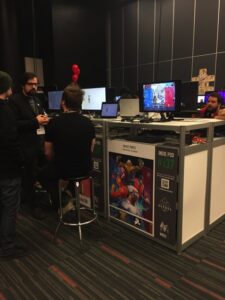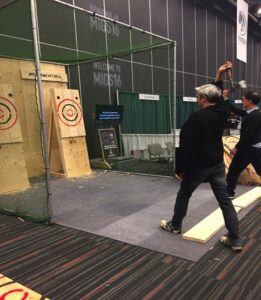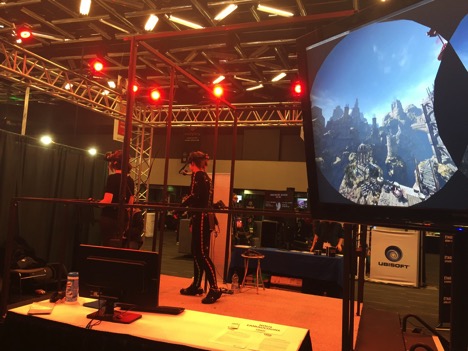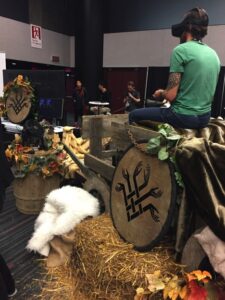For gamers coming up to Montreal in the Fall, one of the most talked-about events other than the weekly game company visits deals with prepping for the Montreal International Game Summit; classes are shuffled around and professors reschedule to accommodate. Titled MIGS for short, for three days in mid-November, MIGS is a gathering place for anyone interested in the game industry. With people appearing from Hibernum, EA, PlayStation VR, Microsoft, Playtika, Frima, Ubisoft, WB Games Montreal, Eidos Montreal, Ludia, and a bunch of indies; MIGS is open to those looking for future jobs.
In fact, they’re marketed not only to those already in the industry but students like us who want to try stepping foot in that door. The price of the tickets is daunting, but with the Super Early Bird discounts, the price can be cut down 20 percent, and even more so for Student passes. I’ve had the pleasure of attending and have some words of advice to anyone looking forward to the 2017 edition.
The first is to get a full sessions student pass. If you’re not used to being identified as a student and having eyes immediately drop to the badge hanging off your chest the moment you strike up a conversation, now is the time to look forward to it. Use this to your advantage, because you’ll find that whoever you speak to won’t shoo you away if you’re a student. You’ll be met with at least the faintest hint of interest and a greeting to find out who you are and what’s your major. In my case, as a game writing intern, I piqued the interest of a few designers and recruiters showcasing their games and was directed towards a business card exchange.
This leads me to the second: make business cards for yourself, with access to your website, and/or portfolio, LinkedIn, and social media handles (namely, Twitter). One of the tactics we’ve learned from company visits deals with how to properly greet and start up a conversation, as well as how it should end with swapping business cards. It’s almost instinct to the receiver at this point because MIGS and all the other conferences they’ve been to are sites for networking opportunities.
This is all done before you step foot into MIGS, and the next parts depend on you and how you approach and converse with employees and employers from game companies. It’s all about how you carry yourself and who you’re with.
Don’t travel in packs. If you’re not used to being on your own and talking to strangers in general, this one’s going to be hard. It’s fine if you grab along a friend, but I can’t stress enough how many potential employers hate it when a mob of students marches over to their booth. Everyone here is a person too, and it’s as stressful for them to address a dozen rather than a duo.
Be professional and be friendly. You don’t have to dress up, most of the people in the summit are fitted casually, but no one in their right mind would storm in like they’ve awakened at the bottom of a chasm or haven’t showered for a century. Be sensible when it comes to appearance because it’ll be their first impression. You and your card should both be presentable. Once you’ve checked off your bucket list of things to do, the rest is all in the fun of exploring.
I cannot tell you just how cool it is to walk around and be with people from the industry. All the fun was located on the Expo Floor with #RageMontreal’s ax-throwing session, where you could try your hand at chucking a real hatchet at wooden targets; Playtika’s bathtub styled ball pit you could jump into, and of course, all the games ready to be played.
MIGS dives right into the VR world, with most of its focus and set up equipped for short demos. Ubisoft’s Watch Dogs 2 was released on November 15th and fell in line with the last day of MIGS. It had one of the longest queued lines because everyone wanted to test out the VR it came with. Ubisoft took up a large space of the Expo and next to it was none other than Vicon partnered with CDRIN to show a woman in a full-body tracking suit for a real-time VR experience:
The next step up for immersive VR fun came from Frima’s notable carriage game, Fated, where you get to climb aboard their carriage prop and take hold of two leather reins as you’re watching the world unfold in the headset. To make it even more immersive they rigged a fan to sprinkle water in tandem with what you see in the game. The whole feat itself was very impressive and set new goals for upcoming games. The line on this one was never short either.
The Indie Zone was a spot that deserved definite praise as well for its innovation on a smaller scale. Although some booths were better than others, every one of them had as much heart put into it as their bigger triple-A or medium-scale counterparts.
The Expo Floor itself was amazing, but if you have the funds and the time, the reason why I suggested the full sessions student pass was because of the conferences given on the last two days. The sessions were spread throughout the day and categorized to suit game designers, programmers, artists, producers, and those dabbling in a little bit of everything.
One was called, “Why the f$#k are you making games?” hosted by Jeff Hattem, founder of Tuque Games. Within this panel, Jeff invited guests of his own: Yves Bordeleau, General Manager at Rogue Factor; Patrice Desilets, Creative Director & Co-Founder from Panache Digital Games; Atul Mehra, Development Director from Spearhead Games; Philippe Morin, co-founder of Red Barrels; Guillaume Provost, Founder of Compulsion Games; and Johan Eile, Chief Operating Officer at Cloudcade.
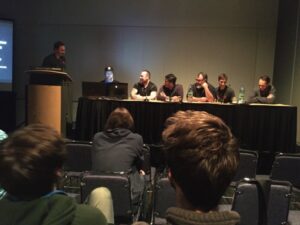
Frankly speaking, this was one of the most inspirational panels I’ve ever gone to. Many of the people who attended weren’t students, but those who’ve fiddled in the game-making industry and found themselves wavering. It wasn’t that they hated it or didn’t want to make games forever, but found themselves at a crossroads.
Information and advice from veterans is invaluable. It makes sense that everyone would have a pen and paper at hand to note down what they’ve said. One memorable quote was, “To change the world you have to change the system within it.” Patrice was the former Creative Director at Ubisoft for twelve years and helped create Assassin’s Creed. His advice dealt with working within the system to get your ideas to the surface.
Philippe’s interest in making games stemmed from his own interest in making movies. His goal was to eventually “[Create games] for the freedom to do what you want to do.” A simple goal but one that many game creators share.
The conversation itself went through a few phases, moving away from the upbeat banter of why these veterans made games, and then took a somber tone after a few questions like, “What obstacles have you faced?” and “What about the finances?” surfaced.
Jeff said, “Yes money is important because you’re writing for an audience. The profits will come when you have a great idea and it resonates with the audiences.” It’s hard to put a personal project into the world and have it shut down, but like most media, once it’s released to the public, they have free range to tear it apart or to praise its ingenuity. “Creative freedom happens when you have the money to do so. The real reason to make games though is to share in the happiness of everyone also making games.”
Phillipe brought up the dangers of passion projects: “What’s dangerous is that you can get really passionate, but you have to deal with the sh***y parts too. Make sure you don’t kill your passion.”
Yves added, “Have people to cover your blind spots, [and] watch out for the pitfalls of obsession! [You need] the maturity to realize your limits. Check your ego, you need people to support you.”
The conversation was brought around again with Guillaume ending it off on a note to always stay humble: “You’ll find yourself outpaced by people smarter, better, and younger than you. Move past your pride and ask for help.”
As competitive as the industry gets, there will always be emerging technologies and people who’re fantastic at what they do. Despite how neck-deep in the industry you may be then, know that there will always be someone better and that it’s not a weakness to ask for help. Even veterans know that there’s always more to learn.
